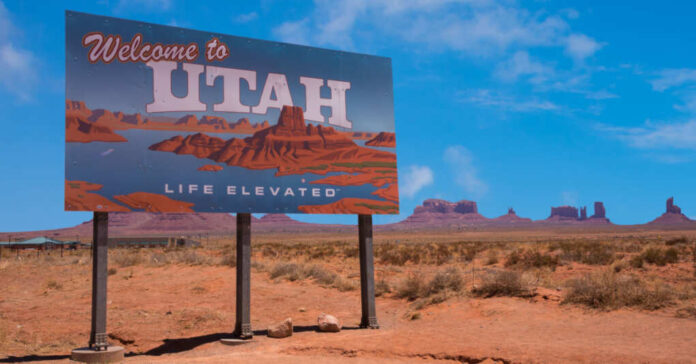In a move that has Democrats donning mourning attire and clutching their pearls, Utah has passed two bold bills aimed at protecting privacy, preserving equal opportunity, and taking a stand against the encroachment of Diversity, Equity, and Inclusion (DEI) in education. Let’s dive into the thrilling saga of H.B. 257 and H.B. 261, where common sense and sanity seem to have prevailed.
Utah’s legislative chambers recently gave a resounding nod to H.B. 257, aptly named the Sex-based Designations for Privacy, Anti-bullying, and Women’s Opportunities Act. The bill, championed by Utah state Rep. Kera Birkeland, a Republican, boldly asserts that men should not be allowed to invade women’s sanctuaries, particularly bathrooms in schools and government buildings.
“Keeping men from women’s spaces is an appropriate and much-needed boundary in Utah and across America,” declared Rep. Birkeland, reminding us that sometimes, boundaries are more than just lines on a map.
Support for this common-sense legislation poured in from unexpected quarters. Competitive swimmer Riley Gaines echoed the sentiment, proclaiming, “Men don’t belong in women’s bathrooms.” Kudos to Rep. Birkeland for leading the charge and ending the absurdity of bathroom confusion.
But that’s not all, folks. Enter H.B. 261, the Equal Opportunity Initiatives Act, sponsored by Utah state Rep. Katy Hall, another Republican powerhouse. This legislation sets out to rid government employers, institutions of higher education, and public education of the shackles of discriminatory practices, including the ominous DEI.
Rep. Burgess Owens, a Republican from Utah and a former NFL player, thanked him on social media. “We’re leaving divisive DEI behind,” proclaimed Mr. Burgess, standing firm against what he has labeled the “leftist mantra of systemic racism.”
Democrats, predictably, responded to these bills with dramatic flair, staging a protest adorned in all-black attire as a symbol of mourning. Protecting privacy and promoting equal opportunity is a cause for grief these days.
Utah’s Governor Spencer Cox, a Republican with a spine, is expected to sign both bills into law. In a December news conference, Gov. Cox did not mince words, calling DEI requirements “bordering on evil.” He stressed that forcing people into a political framework before they can even apply for a job is an absurd overreach by the state.
Let’s delve into the details, shall we? H.B. 257, aka the bathroom bill, requires that, in all publicly-owned institutions and schools, people must make use of the restroom that corresponds to their designated sex at birth. It’s not rocket science here – just common-sense legislation grounded in reality. Exceptions are made for unisex facilities, single-occupant spaces, changing rooms not open to the public, or individuals with intersex characteristics.
Supporters argue that the bill is crucial to protect women from potential predators exploiting transgender accommodations. Opponents, on the other hand, claim it unfairly targets the transgender community. But let’s face it – privacy is a universal right, and pretending otherwise denies fundamental realities.
H.B. 261, the DEI bill, takes a bold stance against the encroachment of DEI initiatives into government entities and universities: no more mandatory DEI training, no more allegiance oaths to DEI principles. Republicans are standing up against the deluge of DEI, acknowledging that while diversity is essential, equity and inclusion shouldn’t come at the cost of individual liberties and the integrity of institutions.
In a year where Republican lawmakers across multiple states have proposed bills countering various DEI initiatives, Utah is proudly leading the charge. Meanwhile, Democrats are filing bills to promote or require DEI measures because they believe government-imposed ideology is the solution to societal issues.
The rise of DEI has been undeniable across American businesses and institutions, but so has the backlash. The U.S. Supreme Court struck down racially discriminatory admissions policies in 2023, prompting state attorneys general to call for an end to racial quotas. A Paradigm Strategies Inc. report highlighted a decline in corporate DEI budgets, suggesting external forces push back against forced DEI investments.
Utah’s legislative stand against DEI is a refreshing departure from the ideological dogma gripping the nation. It’s time to celebrate legislation prioritizing privacy, equal opportunity, and individual freedoms over the divisive forces of DEI. Utah, take a bow – you’ve just given us a masterclass in legislative sanity.



















